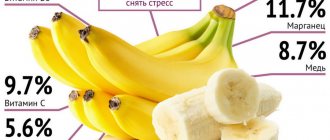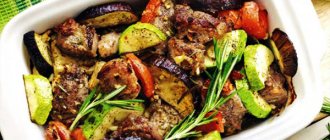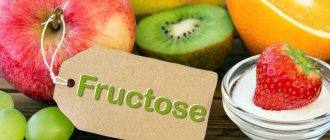Fructose can enter the body in two ways: as an independent substance, and as part of, for example, our usual sugar, which is broken down during digestion into glucose and fructose.
As you already know from the article, carbohydrates are divided into monosaccharides, disaccharides and polysaccharides - according to the number of units contained in the compound - saccharides. Monosaccharides include glucose, fructose and galactose. Disaccharides - sucrose, maltose, lactose - consist of two monosaccharides. Only monosaccharides are absorbed in the body, so all other carbohydrates must first be broken down into their components during the digestion process.
For reasons that have not yet been studied, fructose in the composition of disaccharides is absorbed better than free fructose.
Are foods with fructose harmful?
Foods containing fructose have a lower glycemic index, so they do not cause sudden spikes in blood sugar levels in diabetics. Despite this, fructose-rich foods may be harmful to health to some extent. In terms of calorie content, they are similar to foods containing sugar, although they are often considered dietary.
Fructose can be of natural origin or industrial. The latter is a powder with a sweet taste, which is more pronounced than that of sugar. Fructose in food is not absorbed into the blood, like glucose, but goes first to the liver and turns into glycogen or fat (depending on how much fruit sugar enters the body).
Natural fruit sugar gives the fruit its sweetness. Diabetics and obese people are advised to limit their consumption of foods high in fructose and simply sweet foods. Due to the lower glycemic index, fruit sugar is less harmful, but it is still impossible to consume it in enormous quantities.
What you need to know
Our liver is the main site of fructose metabolism. In the liver, it is processed into glucose derivatives and stored in the form of hepatic glycogen. At one time, the liver can process and store a limited amount of fructose in the form of glycogen. The rest will be stored as fat, so a large single dose of fructose will likely end up on your sides. This is more pronounced in people with high blood lipids, insulin resistance, or type 2 diabetes.
A high intake of fructose (as opposed to other dietary carbohydrates) can cause leptin to not be produced in normal amounts.
Leptin is a hormone involved in the long-term regulation of energy balance. Its level goes up when we get enough calories/energy and goes down when we don't, so it lets us know when to start and stop eating.
Decreased leptin production associated with chronic high fructose intake may have a detrimental effect on food intake regulation as well as body fat percentage. In other words, if you have too much fructose, your brain won't send you the "I've had enough" signals, and you'll continue to eat even though you've already taken in more than enough calories.
Because fructose is retained in the liver, it does not cause a strong glycemic response. And while this may be fine when consuming whole fruit, if you eat added fructose-based sweeteners, the effect is reversed. Although fructose is quite low on the glycemic scale and can help restore liver glycogen during physical activity, excess consumption can lead to the formation of fat in the liver, as well as disruption of energy balance and the body's fat regulation system. As a result, consuming large amounts of fructose-based sweeteners can lead to abdominal obesity, low levels of good and high bad cholesterol in the blood, high levels of triglycerides and loss of appetite control.
Clinical studies show that people who eat plenty of fruits (and vegetables) tend to be leaner, have an easier time maintaining a healthy weight and overall well-being than those who don't.
Additionally
Worried about fruit? Relax. The experts concluded: "Fructose intake from natural, unprocessed food sources is quite low and is unlikely to have negative metabolic consequences."
Eating fruits (and vegetables) can help prevent chronic diseases and even cancer.
Dr. Vioke, the author of a study in which he tracked the effects of fruit consumption on adults for more than 10 years, says there is no need to worry about weight gain from eating fruit: “There is no evidence to suggest any significant weight gain from eating fruit.” eating a lot of fruit."
If you're concerned about your health and optimal physique, go ahead and eat an orange, but think twice before drinking a bottle of orange juice, or worse, a can of orange soda.
The benefits of foods with fructose
As already mentioned, fructose is found in a wide variety of foods and drinks. They are healthier than foods that are sweetened by regular sugar:
- less harmful to teeth;
- fruit sugar is sweeter than regular sugar, therefore reducing the calorie content of foods;
- fructose is absorbed without the participation of insulin;
- does not cause spikes in blood sugar;
- Provides energy to the brain and muscles for a longer period.
In order not to harm your health, you need to consume foods and drinks with fruit sugar correctly:
- Do not overuse and always take into account the energy value of products. Do not consume more than the maximum daily allowance of fructose
- Natural fructose, found in fruits, vegetables or honey, helps strengthen the immune system and gives tone.
- Remember that foods with fructose are not dietary, as many people think.
Factor #1: Calorie intake
There is a possibility that in a high-calorie diet where a person is generally overeating, excess fructose is better stored in fat than excess glucose. The abdominal cavity may especially suffer (accumulation of visceral fat), including the liver.
The ability of fructose to be more efficiently stored in fat is explained by the increased activity of proteins that stimulate lipogenesis (synthesis of adipose tissue). Chronic excess fructose may act as a trigger that enhances lipogenesis. But you need to take into account that fat is deposited only in the case of general overeating - an excess of calories in the diet. That is, weight increases with excess consumption of absolutely any product. So maybe it’s not fructose itself that’s to blame, but banal overeating?
The key phrase is excess fructose, which is part of a hypercaloric diet. There is no excess - most likely there will be no problems.
It has long been known that the accumulation of excess weight worsens lipid profiles and metabolic health, including low- and high-density lipoprotein levels, triglycerides, blood glucose levels, and so on. For this reason, it is difficult even for scientists to determine whether fructose is an important factor that affects these indicators. Most likely, banal overeating is to blame, which leads to the accumulation of excess weight and related health problems.
A 2022 meta-analysis of studies suggests that if fructose-containing foods (meaning added fructose) provide excess calories, they may increase fasting insulin levels and thus trigger the development of insulin resistance. That is, everything again comes down to excess fructose/calorie intake in the diet. In the case of a hypocaloric diet (when a person does not eat enough), it is far from certain that fructose will cause serious health problems.
What foods contain fructose?
Fruit sugar is found in natural foods (vegetables, fruits, legumes, honey), and is also used by manufacturers of such food products as:
- confectionery products (they are often called dietary, but this is not entirely true);
- sweets for diabetics;
- baked goods and desserts;
- sweet drinks, soda, juices.
Some people use artificial fruit sugar to prepare homemade meals to reduce calories and reduce carbohydrates.
Fruit sugar in fruits
Fruits and berries contain a lot of vitamins and no fat, but they often have a sweet taste. It is provided by fruit sugar, the largest amount of which is found in grapes, peaches, bananas, dates, strawberries, pears, apples, melon and strawberries.
How much per day?
The principle is still the same: everything should be in moderation.
Is there an upper limit to fructose intake? This is difficult to answer in relation to weight loss because most of the existing research has been done on individuals with obesity and type 2 diabetes. However, that doesn't mean we can't use existing research to make some rough, educated guesses.
According to one study, the threshold for fructose to start turning into fat was about 60 grams per day on average. Another study indicated a threshold of about 100 grams per day .
So, as a rough guide, 60-100 grams a day shouldn't hurt your fat loss efforts, as long as you exercise regularly and eat properly, so you definitely shouldn't be afraid to eat fruit.
Eat enough protein, watch your total calorie intake, and get your calories from minimally processed foods whenever possible. With this approach, you'll never have to worry about every gram of fructose you consume, since whole, unprocessed foods contain relatively little fructose.
If you don't believe me, we'll prove it. Look, 100 grams of bananas contain only 2.39 grams of sucrose, and 4.85 grams of fructose! One banana weighs on average 200 grams, which means it contains 9.7 grams. fructose. Those. to get 60 grams of fructose, you need to eat 6 bananas.
In 100 gr. grapes contain a little more than 8 grams of fructose, i.e. to eat the bare minimum you will have to eat 750 grams a day. thereof.
Also, do not forget that you need to be careful when consuming fructose during the period of building your dream body, when there is an excess of kcal . If you avoid highly processed foods and sugary drinks, you can easily stay in the “safe” 60-100 gram range.
It's true that too much fructose can be a problem, but too much of any substance in your diet will be a problem . When fructose is consumed in moderation and especially from fruits, there is no reason to refuse deliciousness.
Table of fructose content in products
We bring to your attention a small table that clearly shows the level of fruit sugar in common fruits and vegetables:
| Fruit/vegetable | Fructose percentage |
| grape | 8 |
| apple | 5,5 |
| pear | 5,1 |
| cherry and sweet cherry | 4,5 |
| black currant | 4,1 |
| cabbage | 1,5 |
| tomato | 1,3 |
| carrot | 1 |
| pumpkin | 0,8 |
| potato | 0,1 |
How to eat fruit correctly?
For better digestibility of fruits and berries, there are a number of rules, following which you will not experience discomfort or unpleasant consequences from eating fruits. The norm of sugar consumption per day for women is 26g, for men - 36g.
- Do not mix fruit with other foods.
Carbohydrate foods eaten with fruit (especially bread and other baked goods) begin to ferment in the stomach, causing discomfort. Products containing yeast and sugar are even more susceptible to fermentation. To prevent unpleasant consequences, eat fruit an hour or later after meals. - Don't eat too much fruit
Bloating or fermentation also occurs when you eat a lot of fruit (even on an empty stomach). Apples cause the most fermentation. Most often, newcomers to veganism or a raw food diet face such problems. Their body is simply not able to immediately process such an amount of plant fiber. Don't overeat on fruit or prepare your stomach in advance by starting with small portions of fruit. - Consume fruits with certain foods
Fruits are more than 90% water. It is safe to mix them together with water. You can also eat fruits and berries with raw non-starchy vegetables (cabbage, carrots, herbs and all types of lettuce). By combining these products you can get many different smoothies. - When is the best time to eat fruit?
Fresh fruit is best eaten on an empty stomach, during the first breakfast. Consume fruits, not juices or purees. During one meal, you can eat 2-3 types of different fruits or berries, combining either sweet or sour fruits with sweet and sour ones. Sour fruits and berries contain large amounts of vitamin C. In order not to harm the gastrointestinal tract, it is recommended to mix them with vegan yogurt, desserts, nuts or cereals. A fruit salad is an excellent option for breakfast. If after such a breakfast you quickly get hungry, make yourself a more substantial breakfast - after eating fruit, you can eat any food at least half an hour later.
Which foods contain the most fructose?
You should also find out about foods containing large amounts of fructose and try to remember this list if you are watching your figure, are obese or have diabetes. For convenience, we have collected them in a table:
| Product | Fructose percentage |
| agave syrup | 56 |
| honey | 41 |
| Majul dates | 32 |
| cranberry | 27 |
| figs | 23 |
| Dates of the Deglet Nur variety | 20 |
| dried peach | 14 |
| dried apricots | 13 |
| ketchup | 9 |
| grape | 8 |
| balsamic vinegar | 7 |
| paprika | 7 |
Fructose overdose
On average, fruit contains from 40 to 50 calories per 100 g. Therefore, one and a half kilograms of fruit will contain from 600 to 750 calories. That is, only a quarter to a third of the daily requirement.
But in terms of fructose content, 1.5 kg of fruit will be a very dangerous thing!
Let's estimate the fructose content (direct and from sucrose) in 1.5 kg of fruit (and this is only 6-8 apples, say). To do this, take the % fructose from the table and multiply by 15 and add the % sucrose multiplied by 7.5.
One and a half kilograms of watermelon, say, are eaten in one sitting without being noticed. But they contain about 80 g of fructose (direct and from sucrose). One and a half kg of apples per day is 94 g of fructose. strawberries - about 44 g, cherries - 73 g, oranges - about 60, raspberries - about 62, apricots - 57, sweet grapes - 119, pears - 93 g of fructose.
But vegetarians also have vegetables in their diet! Salatto grosso from 50 g of parsley, 200 g of tomato, 200 g of paprika, 50 g of onion and 100 g of cucumbers is just 600 g of vegetables. It contains about 12 g of fructose. And 2 such salads a day for a vegetarian are no big deal = 24 grams of fructose.
Fructose for diabetics
With diabetes, some people replace foods with regular sugar with fructose ones, as they have a lower glycemic index. The monosaccharide is absorbed by liver cells, which convert it into fats, so you need to be careful not to provoke the development of obesity.
Modern doctors do not recommend that diabetics use fructose as a safe sweetener. This decision was made by WHO, but some people ignore this recommendation. Objectively speaking, if you have diabetes, you can eat foods with the lowest levels of fructose, but you definitely shouldn’t replace regular sugar with fruit sugar.
The body's need for fructose
As mentioned earlier, doctors cannot come to a common decision regarding the unambiguous benefits or harm of fructose for the body. Some of them are sure that fruit sugar is very useful, because with its help you can prevent the development of dental plaque and caries. It does not overload the pancreas and, compared to regular sugar, it is much sweeter, so you can reduce the portions you consume. Another part of doctors claims that gout and obesity can develop from consuming fructose. They managed to come to a common opinion only on the issue that if you consume foods containing this monosaccharide in normal, moderate quantities, then this will only benefit the body.
Products without fructose
There are people suffering from fructose intolerance who are advised by doctors to avoid foods containing fructose. There is also a rare hereditary disease, fructosemia, in which you should also somewhat limit your diet.
You definitely need to remove all sweet fruits and juices, honey and fortified wines from the menu. The list of products without fructose is quite extensive, so despite the restrictions, the diet can be made very diverse:
- meat, fish, seafood, mushrooms;
- dairy and fermented milk products;
- eggs;
- cereals;
- chocolate;
- pasta and much more.
Typically, people with fructose intolerance are aware of their condition and are observed by a doctor, who always indicates restrictions and gives recommendations on the formation of a daily menu, as well as methods of preparing foods.
And a little “but” and “however”
Of course, fructose from fruits and fructose from sweets, whether made with fructose or sucrose, or from fruit juices made from concentrates, are very different products. In order to extract fructose from fruit, the body needs to digest a large number of plant cells (which we did not crush when we chewed the vegetation).
This takes time and therefore fructose from fruits or vegetables does not come in one gulp, but much more gradually. This makes it easier for the liver and the body as a whole to cope with it.
conclusions
They are, in fact, obvious! No matter how tempting, practical, sweet and tasty the fruitarian diet may be, 1.5 kg of fruit will contain one and a half to two times more fructose than is considered safe.
So if you eat one and a half to two times more vegetables and greens than fruits and get up to 40% of calories from fat, then your body will happily thank you and, in gratitude, will lose weight and become healthier.
How much fruit should I eat? Sweet and high-fructose 500-800 g, low-fructose - up to 1 kg, be guided by availability and Table 1. To calculate the amount of fructose in 1 kg of products in the table, you need to multiply % fructose by 10 and add % sucrose multiplied by 0.5. It's simple!
Sources of information and inspiration
- www.newsroom.ucla.edu; - www.medbio.info; - www.drkaslow.com; - www.wikipedia.org; — www.salkova.ru; — Diana R. Mager The Effect of a Low Fructose and Low Glycemic Index Load (FRAGILE) Dietary Intervention; - www.umj.com.ua; - www.healthycase.ru; — Julia Enders "Charming Gut";
Published in the magazine “Pharmacy Sales Recipes” No. 6, 2018.
CAUTION: Always consult your doctor when making any changes to your diet or lifestyle, as there may be contraindications in each specific case. The recommendations provided in this article are not a substitute for professional medical care, consultation, diagnosis, advice, or treatment. The author and publication do not accept responsibility for the results of any use of the above information.











